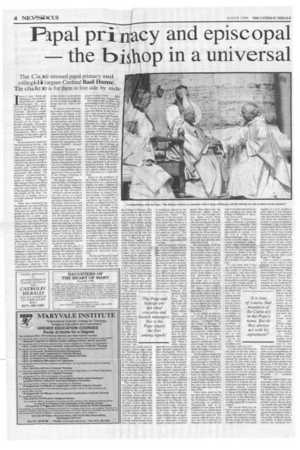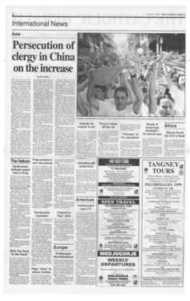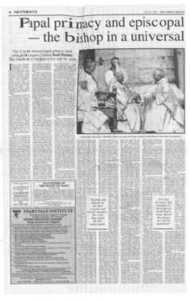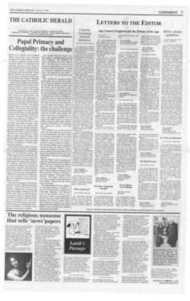Page 4, 16th July 1999
Page 4

Page 5

Report an error
Noticed an error on this page?If you've noticed an error in this article please click here to report it.
Tags
Share
Related articles
Papal Primacy And Collegiality: The Challenge
Communion Comes First
Cardinal's Plain Speaking At The Synod
Council At The Point Of No Return
The Slow Move Towards Collegiality
Pipal prinacy and episcopal the bishop in a universal
The Coulil stressed papal primacy and collegiality argues Cardinal Basil Hume.
The challei, is for them to live side by side
Ichallenges LIKE tube 1:t sit, referring to twoexr_s. (I which always itspiLiresJ rm, cot from the DogmaticCcoria tion on the Church, .L.a4a Gentium: "Bishop rciale particular Churches eritrua to them as vicars an legator Christ... They arenot tr thought of as vicars .oh Roman Pontiffs, bcat.Aise power which they wield, their own property ..''
They give us matter for sit prayer, as we raise or heann gratitude for so great a g, while also acknowedgingn my case at any rate a tiingaf shame for havingbeen Its than adequate in the dischk ing of my duty. These was cc:pante a personal challeoe to every bishop. When I stoco reflect on the great dignity ht is ours as bishops and tlir.k about what is expected of e, I am quite likely to havt a moment of panic. Ithert goo look for consolation ink Matthew's Gospel, tie passke referring to that unlikely cart-date, Levi, the tax-eollecta I also read the first chapteiof St Paul's first letter to tie Corinthians, where he motes about God choosing the weals of this world to confound the strong, choosing the things that are not to bring to nought the things that are. Then I feel better.
We need to remember, too, the words of Lumen Gentium: "The order of bishops is the successor to the college of the apostles in their role as teaches and pastors, and in it the apostolic college is perpetuated. Together with their head, the Supreme Pontiff, and never apart from him, they have supreme and full authority over the universal Church; but this power cannot be exercised without the agreement of the Roman Pontiff' (Lumen Gentium 22).
Cardinal Dearden then commented: "It is too easy and theologically incorrect for a bishop to feel that his duties focus entirely on the church community given to his care. It is a subtle kind of selfdeceit to hide behind the press of local responsibilities and to ignore one's role as a member of the College of Bishops to the universal Church".
The decree concerning the pastoral office of bishops was very clear about what our priorities should be. A bishop, I read in this document, "should be with his people as one who serves, as a good shepherd who knows his sheep and whose sheep know him... His priests, who assume a part of his duties and concerns, and who are ceaselessly devoted to their work, should be the objects of his particular affection. He should regard them as sons and friends. He should always be ready to listen to them and cultivate an atmosphere of easy familiarity with them, thus facilitating the pastoral work of the entire diocese" (Christus Dominus, n.16). I do not think there is one of us who would question that our first priorities must be our priests and people.
But we are also part of a broader picture, the College of Bishops. We enter that College through sacramental ordination. In the third century Hippolytus pointed out that the presence of the co-consecrators is evidence that through episcopal ordination we are jcooillneegde two hit hcahtthbeoyd represent. The that resent. The Church tells us that our The Church tells us that our membership of this College of Bishops is m fact anterior to our taking possession of a particular church. In the Apostolic Letter Apostolos Sups On the Theological and Juridi_ cal Nature of Episcopal Conferences, issued by Pope John Paul II in May 1998, we read: "...the College of Bishops is not to be understood as the aggregate of the bishops who govern the particular churches, nor as the result of their communion; rather, as an essential element of the universal Church, [the College of Bishops] is a reality which precedes the office of being the head of a particular church" (Apostolos Suos, n.12). We are successors of the Apostles collectively, therefore, before being appointed to govern a particular church. The universal Church is prior to the particular church, which is in fact its realisation in a specific place.
Since we are members of the College of Bishops before being head of a particular church, we have a degree of collective responsibility within and for the universal Church. Each bishop, as Lumen Gentium 23 states, "as a member of the Episcopal college and a legitimate successor of the apostles, is obliged by Christ's decree and command to be solicitous for the entire Church". This raises the question of how this responsibility is exercised and the nature of collegiality. Let me say first that the recent Apostolic Letter to which I have referred, Apostolos Suos, has helpfully clarified one aspect of this question regarding effective collegiality. It states that it is only when assembled with the Supreme Pontiff in a General Council or when exercising its ordinary magisterium, that the College of Bishops can be said to be an expression of effective collegiality (cf. Apostolos Suos, n.9).
The Second Vatican Council was a clear example of collegiality in action and it had much to say about the relationship between the Pope and the College of Bishops. The Council did not cast the Pope and bishops in the roles of chief executive and branch managers, nor did it see the Pope as simply the first among equals. It stressed papal primacy and collegiality. The challenge for today is for these two to live side by side. Let me quote again from Apostolos Sues: "Collegially, the order of Bishops is, 'together with its head, the Roman Pontiff, and never without this head, the subject of supreme and full power over the universal Church'. As it is well known, in teaching this doctrine, the Second Vatican Council likewise noted that the Successor of Peter fully retains 'his power of primacy over all, pastors as well as the general faithful. For in virtue of his office, that is, as Vicar of Christ and pastor of the whole Church, the Roman Pontiff has full, supreme and universal power over the Church. And he can always exercise this power freely'" (Apostolos Suos, n.9).
We have to place this teaching side by side with the complementary teaching of the Vatican Council that stresses the link between the Petrine office and the College of Bishops. In his 1997 encyclical Ut Unum sint the Pope emphasises this link. He says that his office cannot be separated from that mission "en trusted to the yvhole body of bishops", aned he makes clear that "Tine Bishop of Rome is a metrerber of the College of Biishops and the bishops are his brothers in the ministry" (n.95). What is at the heart of this relationship between the Pope and the College of Bishops is the unity of the Church. In his diocese the Bishop is the Vicar of Christ for his people, but he also affirms the Pope's universal jurisdiction. This leads us to consider how papal authority is exercised not only in the universal Church but also in particular churches. In 1992 Cardinal Ratzinger wrote about the universal Church being "interior" to the particular church. He made it clear that papal authority is not exercised only from outside the particular churches, but also within. He said "we must see the ministry of the successor of Peter, not only as a 'global' service, reaching each particular church from 'outside', as it were, but as belonging already to the essence of each particular church from `within'"...The ministry of the Successor of Peter as something interior to each particular church is a necessary expression of that fundamental mutual interiority between universal Church and particular church". This corresponds to that instinct of faith in Catholics, that they have a direct relationship with the Pope.
This relationship between the universal Church and the particular church is expressed and mediated in various ways. One of the structures to facilitate this relationship is the Roman Curia, which I notice is the focus of one of your workshops. For my part, l would like to acknowledge the help and support I have received from the Curia in many situations. But it would be naïve to presume that all relationships with the Curia are ideal. If now I proceed to sound a note of criticism, it is out of fraternal charity and a love of the Church. For instance, some of us would have been surprised by the form and tone of some letters from Curial offices. There are concerns about the manner of some episcopal appointments and the length of time taken to make them. Not all appointments have been satisfactory. There is often unease about the way in which theologians and their writings have been investigated. There can be a sense of frustration at not having been consulted on issues which are important to us as local bishops. In an institution such as the Church, where human beings are entrusted with varying tasks, there are bound to be misunderstandings, tensions and a certain clumsiness in dealing with things on a world-wide scale. All such difficulties can be resolved by goodwill and common sense, but always within the context of openness and a willingness to dialogue.
This leads me to wonder about another important relationship in the Church, that between the Holy Father and his Curia. It is true, of course, that members of the Curia act in the Pope's name. But do they always act with his acknowledgement and agreement? I expect that you have had my experience of being quoted, or had my mind inter preted. They used to say "the Abbot says. thinks wants". Now it is "the Cardinal who says...thinks...wants". When an organisation is very big, officials exercise greater individual power. That is why I have long thought it would be good if the Pope were to call together all the presidents of the Conferences of the world every two years or so, so that he could hear directly their collective advice.
The ecclesiology of all that has been said up to now acknowledges the fact that "it is in the name of the Lord that the diocesan bishop leads the flock entrusted to him, and he does so as the proper, ordinary and immediate pastor" (Apostolos Sues, n.10). His actions within the diocese are not collegial but personal. The power of the bishop is in no way diminished by the supreme universal power of the Pope but is in fact defended, upheld and strengthened by it. (Lumen Gentium 27). Indeed, we would all agree that not only is the Holy Father well aware of the status and role of the local bishops as taught by the Second Vatican Council but his personal interest and support of us as individual bishops have been an outstanding feature of his pontificate.
As we reflect on the various levels of action and responsibility within the church — the Petrine Office, the College of Bishops, the national or regional Bishops' Conference, the local bishop in his diocese — each of these has its own role and competence. The principle of subsidiarity is a warning against a centralising tendency which might obscure or even deny the proper freedom and dignity belonging to each level, and to each individual.
The development during this century of the role of the Bishops' Conferences is surely a good example of subsidiarity within the life of the Church. The Extraordinary Synod of 1985 acknowledged the pastoral usefulness, indeed the need, for Episcopal Conferences. The Synod called for a study of their theological and juridical nature, and the fruit of that work was the Apostolic Letter Apostolos Sues issued in May 1998.
I have been struck by the fact that the Letter envisages the doctrinal declarations of the Conference of Bishops constituting an authentic Magisterium and to be published in the name of the Conference, on condition that what is published has been unanimously approved. This seems to indicate to me, at any rate, that the Conference of Bishops is more than the sum total of the individual bishops and something less than the College of Bishops (cf. Apostolos Sues, n.10).
Episcopal Conferences surely constitute a genuine expression of collegiality. This collegial spirit is much more than the genteel and cheerful atmosphere of a group. It is the soul of collaboration between bishops. The source of this is to be found in the concept `communio% reflecting the unique bond that unites a bishop to his fellow-bishops in virtue of their episcopal ordination. Surely it is the collegial spirit, rooted in the gift of `conununio', that must lie at the heart of each Conference.
It's not often that I find myself blundering into the finer points of ecclesiology, collegiality and episcopal status. I did this because invited to do so. But the kind Bishop Bob Lynch did suggest to me that I might speak of some personal experiences of the last 20 years or so. What I am about to tell you is not entirely remote from the academic excursus which I have just given you. But we know that in practice as bishops we are often on our own, dealing with immediate problems or trying to cope with the latest crisis. To me this is very apparent when I go to my study after breakfast each morning to open my post.
It is not easy to be faced at that point in the day with a vitriolic attack on a parish priest because he has reordered the sanctuary of his church. This first letter of the day will probably end on a note of triumph with the words "far less people go to Mass than used to, so you can see what your liturgical reforms have achieved". It is going to need a long answer in which I shall have to explain that an important document of the Second Vatican Council mandated us to make all kinds of change in the liturgy. Many, but by no means all, of those who write to me objecting to liturgical changes are also reacting against the Council in general.
The second letter may be from someone equally angry.
She wants to be ordained a priest, fully believes in women priests, and maintains strongly that the matter should at least be open to debate. I ask myself
`It is of cour memb the Cu in the name. they a act w agree
whether it is ever sensible to stifle debate in the Church? Personally, I have no problem with what the Holy Father has said about the ordination of women. I accept his authority obediently. I reply to the letter saying that the Holy Father has made it clear that it is not the mind of Christ that women should be ordained priests and that we have to accept the situation. I know in my heart of hearts that I will get a letter back from the lady saying that she is neither impressed nor convinced by what I have written. "Wasn't her opinion as good as anybody else's, even Rome's?" Oh dear!
Then I come to another letter, which objects very strongly to the norms issued .41brour Conference with regard to Eucharistic sharing. "Surely Jesus would not turn me away from his table?" That is a difficult argument to counter. But I answer that if the theology outlined in our Conference's teaching document on Eucharistic sharing, One Bread One Body, is valid, then so are the norms which logically follow. If the norms are to change, so must our theology of the Eucharist. I just knew that this answer would cause
true, se, that ers of ria act Pope's But do 'ways ith his ment?'
pain and, indeed, anger. So far it has been a difficult start to the day!
A fourth letter, from a regular local correspondent, runs to five closely-typed pages. It claims that I had overstepped the mark in my interpretation of that well-known phrase "at the discretion of the local Ordi_ nary" and accuses me of not being sufficiently docile to the directives of the Holy See. At the bottom of the letter was the phrase which will be famil iar to many of you, namely `Copied to Cardinal Ratzinger'.
The next letter looks very important, since it has come from the Vatican. One of the Congregations is calling me to one of its Plenary Sessions.
My first reaction was one of considerable irritation, to say the least. Didn't they realise they had only given me a month's notice, that my diary was already full, and that I had a diocese to run? Then a differ ent voice within me began to speak and reminded me that I, like any other bishop, have a role to play within the universal Church. It didn't entirely remove my irritation, but I found my way to accepting the inevitable, and I trust not too unwillingly.
Among the pile of letters there is also one from the Nuncio. It enclosed another from one of the Roman dicasteries. It was taking exception to something they had heard had taken place in the diocese. I couldn't help wondering who it was had communicated whatever had shocked the writer. I had a shrewd idea that I knew, but I must not allow annoyance with the person to get in the way of my judgement of the complaint. But what I found more annoying was that, on this occasion, it seemed a judgement had been made without first consulting the local bishop. But was it just pride that made me feel that a more tactful approach would not have made me feel I was a naughty schoolboy caught doing something unacceptable? Then I opened the next letter. It was wishing me a happy birthday. Oh dear, I realised how old I was becoming. I'm sure somebody else should be answering these letters, but it is not for me to choose. But wouldn't it be sensible to lower the age when we are expected to retire? And would there not be merit in standing down after, say, fifteen years as a diocesan bishop? Then we could happily embrace a lighter load, helping out in another way.
These experiences make me realise how complex are the range of issues facing a bishop today. One of these is how to deal with dissent, when authority tends not to be respected and moral judgements, being so subjective, are unashamedly relativist. It seems to me that it is important that a bishop should aim to keep the whole of his flock within the one fold. There will be in the flock considerable differences of opinion, mutual antagonisms, and the exchange of unkind comments. This is a recipe for disaster for the Gospel. This kind of situation demands of us exceptional gifts of charity, patience and understanding.
I am constantly being urged to suppress this group of people or that group, or drive out of the church this lot or that lot. I do not believe that this is right. I believe that as a bishop I have to try to lead people from where they are to where they never dreamt they might go. If you drive a person out of the Church you have taken a very grave responsibility on yourself.
I have often been struck by the parable of the wheat and the tares in St Matthew's Gospel (chapter 13). I have often been urged to uproot the tares. No, the wheat and the tares must grow together. Have you noted a remarkable passage in Humanae Vitae? Pope Paul VI wrote: "If, on the one hand, it is an outstanding manifestation of charity towards souls, to omit nothing from the saving doctrine of Christ, still, on the other hand, this must always be joined with tolerance of charity. Of this, the Lord himself in his dealing with people has left an example."
Is it not true that a "divided Church" will result in a "divided Conference"? With a divided Church, how should a Bishops' Conference behave? It seems to me that the dawning of the new millennium, looming ever closer, is a time crying out more than ever for the striking witness of a single voice. We are in a rapidly changing world transformed by transport and communication. The phrase the "global village" is more commonplace. As bishops we must respond to this reality with a ministry that is ever more global. Pope John Paul II himself has given us a striking example of harnessing these developments to great advantage. His is truly a universal ministry. In person he has proclaimed the Gospel message throughout the world. His visit to America earlier this year was the 85th journey abroad in his pontificate, a truly remarkable achievement. His teachings, especially recent Encyclicals, have been talking points for people of all faiths and none. Through John Paul II the distinct voice of the Catholic Church is proudly proclaimed. We would do well to follow his example as we lead the Church into the new millennium.
As we prepare for the Holy Year I would like to suggest that we look again at a remarkable passage in Evangelii Nuntiandi, written by Pope Paul VI in 1975: "The world is calling for evangelisers to speak to it of a God whom the evangelists themselves should know and be familiar with as if they could see the invisible."
We want our people to walk as if they could see the invisible and to have fallen in love with God. The pilgrim people of God, journeying into the next millennium, must meet again that pilgrim coming in the opposite direction, him who is the way, the truth, and the life, whom to see is to have seen the Father. Christ must be born afresh into our world.
This is an edited version of an address videorecorded by Cardinal Hume and played to the US Episcopal conference last month shortly after his death. The full text of this and of the Cardinal's address on the Catholic Common Ground (an edited version of which appeared last week) is published in this month's Briefing, available from The Catholic Media Office, 39 Ecclestone sq, London SWIV 1BX, at £3.
blog comments powered by Disqus













